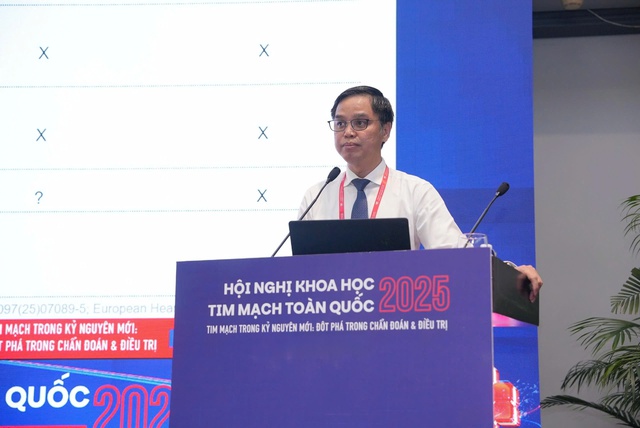The discussions focused on the relationship between cardiovascular diseases and infectious diseases – a two-way relationship that has been under-recognized but is affecting patients' health.
According to the Ministry of Health, more than 200,000 Vietnamese die each year from cardiovascular diseases, accounting for about 33 percent of total deaths.
According to Prof. Dr. Pham Manh Hung, vice-president of the Vietnam National Heart Association, individuals with cardiovascular diseases face a higher risk of complications compared to healthy people when catching such illnesses as influenza, COVID-19, pneumococcal pneumonia, and lower respiratory infections caused by respiratory syncytial virus (RSV).
A study has shown that patients with congestive heart failure are 4-33 times more likely to be hospitalized due to RSV compared to individuals without this condition.
Moreover, in cases of pneumococcal pneumonia, the incidence of onset heart failure events increases by more than 14 percent, and the risk of myocardial infarction rises by more than seven percent compared to baseline.
This creates a two-way relationship: the underlying cardiovascular conditions make patients more susceptible to infections such as influenza, COVID-19, or pneumococcal disease, while acute infections, in turn, contribute to an increased risk of serious adverse events in individuals with cardiovascular conditions.

Prof. Dr. Pham Manh Hung, vice-president of the Vietnam National Heart Association, underlines a two-way relationship between cardiovascular diseases and infectious diseases.
Therefore, at the conference, leading experts agreed that the effective prevention of infectious diseases is one of the crucial solutions for helping break this vicious cycle.
In particular, vaccination is one of the effective measures that can help prevent infectious diseases for cardiovascular patients.
This perspective has gained support from major global health organizations, including the American College of Cardiology (ACC).
Furthermore, professional associations in other places – such as the Taiwan Society of Cardiology and the Infectious Diseases Society of Taiwan, as well as medical societies in Portugal – have issued recommendations and consensus statements on preventive care for patients with cardiovascular diseases.
A common theme across these guidelines is the emphasis on vaccines as a foundational pillar in infectious disease prevention strategies for individuals with underlying heart conditions, particularly older adults.
In Vietnam, the Vietnam National Heart Association has updated its consensus on vaccination against certain infectious diseases for adults who have cardiovascular disease or are at high risk, while also fostering healthcare professional training, community education, and improved vaccine access for high-risk groups.
The goal is to make infectious disease immunization an integral part of cardiovascular patient care.
To implement this strategy, healthcare professionals play a key role.
According to Assoc. Prof. Dr. Duong Thi Hong, deputy director of the National Institute of Hygiene and Epidemiology, an impressive 86 percent of patients would agree to be vaccinated against influenza if recommended by their cardiologist.
Therefore, Associate Professor Hong emphasized that preventive and treatment physicians need to collaborate to incorporate vaccination counseling as an essential part of routine medical consultations; and infectious disease vaccination practices should be integrated into medical care, particularly for adults with underlying conditions.

Assoc. Prof. Dr. Duong Thi Hong, deputy director of the National Institute of Hygiene and Epidemiology at the 2025 National Cardiology Scientific Conference
Addressing how to integrate vaccination within hospital management, Dr. Nguyen Hoang Hai, director of Gia Dinh People's Hospital in Ho Chi Minh City, stated: "The key points to optimize adult vaccination practices are that physicians should regularly discuss vaccination with their patients, provide clear recommendations and explanations about why vaccines are necessary for disease prevention, and most importantly, guide patients through a simple vaccination process.
"Only then can we overcome vaccine hesitancy, protect the elderly from vaccine-preventable diseases, and make infectious disease vaccination a medical pillar not only for cardiovascular patients but also for those with other chronic conditions."

Dr. Nguyen Hoang Hai, director of Gia Dinh People’s Hospital in Ho Chi Minh City, shares insights on integrating infectious disease vaccination into hospital management.


Max: 1500 characters
There are no comments yet. Be the first to comment.